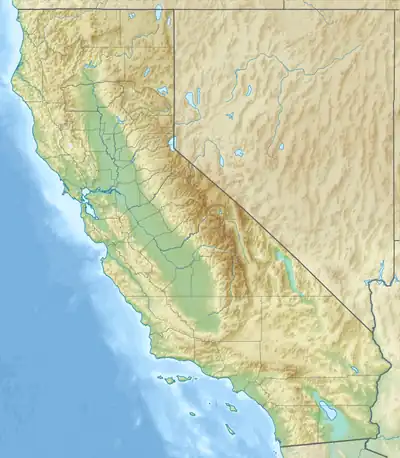| Hot Springs Mountain | |
|---|---|
 Hot Springs Mountain  Hot Springs Mountain | |
| Highest point | |
| Elevation | 6,526 ft (1,989 m) NAVD 88[1] |
| Prominence | 2,613 ft (796 m)[1] |
| Listing | California county high points 34th |
| Coordinates | 33°18′55″N 116°34′47″W / 33.3152282°N 116.579770403°W[2] |
| Geography | |
| Location | San Diego County, California, U.S. |
| Parent range | Peninsular Ranges |
| Topo map | USGS Hot Springs Mountain |
Hot Springs Mountain is a peak located in the Peninsular Ranges in California. The mountain rises to an elevation of 6,533 feet (1,991 m)[2] and is the highest point in San Diego County.[1] Some snow falls on the mountain peak during winter.[3] It is located in a remote region of the county, 4 miles from the community of Warner Springs, 12 miles from Borrego Springs, and 50 miles from San Diego. The mountain and its immediate surroundings belong to the Los Coyotes Band of Cahuilla and Cupeno Indians.[4] The summit and fire tower can be hiked via the Sukat Road route from the campground. Hikers and campers must pay an entry fee to access the area.[5]
The peak offers views of San Diego, Riverside, San Bernardino, and Imperial counties on a clear day. To the north, Mount San Jacinto and Mount San Gorgonio can be seen, and on a very clear day, Mount Baldy (Mount San Antonio) can be seen too. Toro Peak and San Rosa Mountain are visible due northeast. Looking east, the Anza-Borrego Desert State Park is visible, along with the Salton Sea. Visible to the south is Cuyamaca Peak, the second highest point in San Diego County. On a very clear day, urban San Diego can be seen across the mountains. Finally, to the west, the extreme vastness of the Pacific Ocean is visible, even Catalina Island. The furthest point visible is the Topatopa Mountains of Ventura County over one hundred and fifty miles away. Palomar Mountain is also a point of interest. Tree species found on the mountain peak include Jeffrey Pine, Ponderosa Pine, White Fir, Incense Cedar, and Sugar Pines with their trademark drooping branches.
From 2010 through 2012, the mountain and the surrounding land were leased by the tribe to a military training business, Eagle Rock Training Center. The business was evicted in early 2012 at the conclusion of an acrimonious court dispute.[6]
References
- 1 2 3 "Hot Springs Mountain, California". Peakbagger.com. Retrieved 2009-02-05.
- 1 2 "Hot Springs". NGS Data Sheet. National Geodetic Survey, National Oceanic and Atmospheric Administration, United States Department of Commerce. Retrieved 2009-08-06.
- ↑ "Section M262B - Southern California Mountains and Valleys". U.S. Forest Service. Archived from the original on 2011-02-03. Retrieved 2014-01-30.
- ↑ "Los Coyotes Indian Reservation".
- ↑ Hazzard, Cris (2021-04-02). "Hot Springs Mountain Trail Guide (San Diego)". HikingGuy.com. Retrieved 2021-04-02.
- ↑ "Judge rules training center eviction was legal". San Diego Union Tribune. 2012-02-02.
External links
- "Hot Springs Mountain". Geographic Names Information System. United States Geological Survey, United States Department of the Interior.